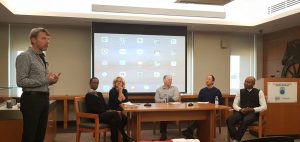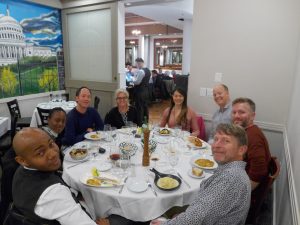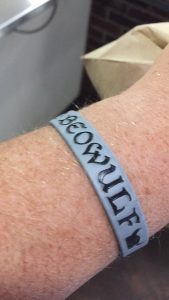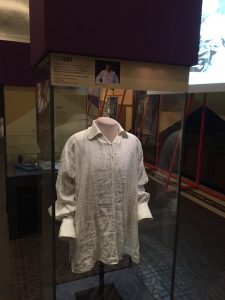One story (Odyssey) returns to rest with comfort and stability. Another (Iliad) seeks disruptive change. Sometimes, for a little while, the two stories entangle in a happy way. That gets us to Utopia, whether by that invented word we mean an imaginary 500-year old island or a Parkway in Queens.
Thinking about the great REFUGE symposium that Jeffrey Cohen and Jonathan Hsy put on at George Washington University’s Medieval and Early Modern Studies institute last Friday — here’s Jeffrey Cohen’s blog-encomium about its the joys and struggles — I’m recalling now the ways we interlaced the home-story with the change-story.
Three academic speakers were book-ended by two glorious creative artists. I’ll start with the last one first.
D.J. Spooky, who’d flown all night after a concert in Seattle to get to his onetime home in DC, closed us out with Utopia and more. In a dizzyingly “non-linear” talk, in which he browsed us through images from his ipad rather than following a straight-line slideshow, he skated from Thomas More to Einstein and Tagore, Antarctica as symbol of de-politicized territory, deterratorialization via Delueze and Guattari, DJ-ing as the “folk vernacular” of the twenty-first century, and much more.
His speech, like his arrival, radiated motion: utopia as a constantly shifting palace of pleasures and enthusiasms, always moving but never unavailable. Not a stable refuge so much as a happy journey.
On the low-tech opening side of the evening was the poet Patience Agbabi, who gave a profoundly moving and gorgeous reading of her long poem “The Refugee’s Tale,” in which she re-fashioned the story of a Somali refugee seeking asylum in Great Britain into a “heroic crown” or double corona of sonnets. The form comprises fifteen sonnets, the first fourteen of which are linked by having the last line of one poem become the starting line of the next. The fifteenth poem crowns the whole by combining all fourteen previously shared lines. Listening to the intricate play of repetition and variation structuring a Sudanese Coptic woman’s deeply contemporary international odyssey, with its dangers and fears and frustration, shows how formal poetics still works with contemporary matter.
Patience’s poem ends in stable refuge, with memories of motion insinuating themselves still:
The story ends where you put the frame
but however it begins, remember my name.
What did we three literature professors do to fill up the space between Patience’s formal beauty and DJ Spooky’s playful movement?
Pam Troyer’s “At What Cost?” juxtaposed Chaucer’s “Man of Law’s Tale” with the legal and personal tribulations of twenty-first century refugees, in particular young “train-surfers” entering the US from Mexico. Tales of relentless motion and struggle.
I spoke about “Motion Sickness” and the disorienting feeling of being at sea, with help from David Hadbawnik’s Aeneid, Caroline Bergvall’s Drift, and Stephen Collis’s “The Lawyer’s Tale.” Motion without rest.
Jonathan Hsy showcased several academic and para-academic projects, especially Je suis avec eux, a photo project in solidarity with 21c migrants, and the historical database, “England’s Immigrants 1330-1550.” Jonathan showed that refuge can be found, sometimes, with difficulty. The data visualization of premodern immigrants in an England that contemporary nationalists often assume to have been monoracial and monocultural gestures toward a less nostalgic and more varied history of multicultural Europe — a historical vision, as several people mentioned, that is increasingly under siege in these post-Brexit days.
I’ve seldom been part of a symposium that was so deeply intertwined, not just because several of us responded to the Refugee Tales book and project in which Patience’s poem and one of my three primary texts was published this past June. Even more, the engagement between all of our thinking, during and after the presentations, flowed out of an attempt to think across controlling master-narratives, the home-genre (Odyssey) and disruption-genre (Iliad). We used both kinds of stories to think ourselves into sympathy with radically other lives.
We need both stories, home and disruption, and we need to think them in dialogue with each other. As a parent of teenagers, I’m becoming acutely aware that home is a place to leave as well as to seek refuge. Events like this one untangle and sometimes re-interlace our craving for rest with restless curiosity.
Such a pleasure to think with the imaginative people of GWMEMSI again!




Leave a Reply